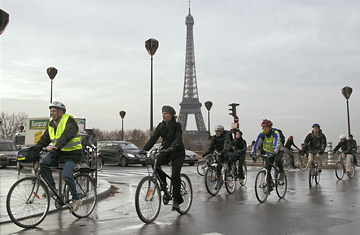
Paris commuters cycle to work during a continuing transport strike against pension reforms
During his first six months in office, French President Nicolas Sarkozy has repeatedly shown his talents as a captivating performer on the world stage. In addition to that flair for dramatics, Sarkozy is now proving he also possesses an essential skill of a rock star: the late arrival on stage designed to agonize audiences with anticipation and longing.
As strike-weary French commuters head into their second week of minimal public transportation, many of them ask why the previously omnipresent Sarkozy has gone missing in this critical moment of his presidency. "He's quite simply waiting for the right time to step in," said Elysée spokesman David Martinon in response to questions about Sarkozy's delay in wading into a conflict that depends on his action.
When will that be? The question was posed anew on Tuesday, when unions representing France's five million civil service workers called on teachers, hospital workers, postal employees, and administrative staff to leave their jobs and join nation-wide protests against government plans to slash nearly 23,000 public sector jobs next year. Those walkouts greatly broadened the front opposing government reform initiated Nov. 14 by transport and utility workers, whose ongoing strikes against the tightening of their pension schemes have caused most rail travel throughout France to be canceled, and have brought suburban train, subway, and bus service to a crawl. Tuesday's movement even found echo in the private sector, where Air France employees resumed strikes begun in late October to demand better pay. That mass action was set to be followed Wednesday with protests by students angered over university reforms, and next week by justice workers who oppose government reorganization plans that will close scores of courts across the country.
With opposition to his program widening, Sarkozy used a speech Tuesday to French mayors to reiterate his determination to pursue the contested reforms, yet vowed "There will be neither winners nor losers." That wasn't the kind of active engagement many pundits expected in the current showdown with unions. Even his conservative backers and resisting union leaders seemed anxious for Sarkozy to become personally involved in resolving the conflict. But it's still unclear when that will happen. With Sarkozy's personal involvement as arbiter viewed as decisive in brokering a solution, his rather predictable comments Tuesday suggest he's willing to risk the strikes continuing into next week, when he'll return from an extended visit to China. "We're not going to try to predict the unstable nature of French protest movements," Martinon says. "We'll just keep focused on applying reforms voters elected the President to carry out."
Sarkozy's record of total involvement in running French affairs — and the critical importance that victory in the current conflict is to his wider reformist and presidential regime — leave no doubt the President will eventually wade in with his usual high profile. But some observers believe that inevitability is why Sarkozy has opted for the strategically unexpected furtive approach. "He's made the non-negotiable essentials of this reform clear to everyone, so now he's probably letting unions and government officials lock horns until he sees the opportunity to step in and break the loggerheads with mutually acceptable compromise," says Jacques Mistral, head of economic research for the French Institute on Foreign Relations in Paris.
Mistral says that could involve getting unions to accept Sarkozy's main demand: increasing the number of years public sector employees must work to qualify for full pensions to match the levels in the private sector. State-owned employers would then be allowed to come up with salary or benefit trade-offs that would make that retirement reform acceptable. "That way, Sarkozy applies reform where others failed, and unions and employees feel they've come away better off," Mistral explains.
Keeping his distance has other strategic value for the French President. "Should this become a Thatcherian struggle with unions for survival, Sarkozy's position above the fray will allow him to appeal directly to the public for it to choose sides — meaning his," Mistral says. "By resurfacing as things really get tough, he's in a better position to make a convincing appeal that he'll now try to over come union defiance — but will need demonstrative backing of the public to do so."
